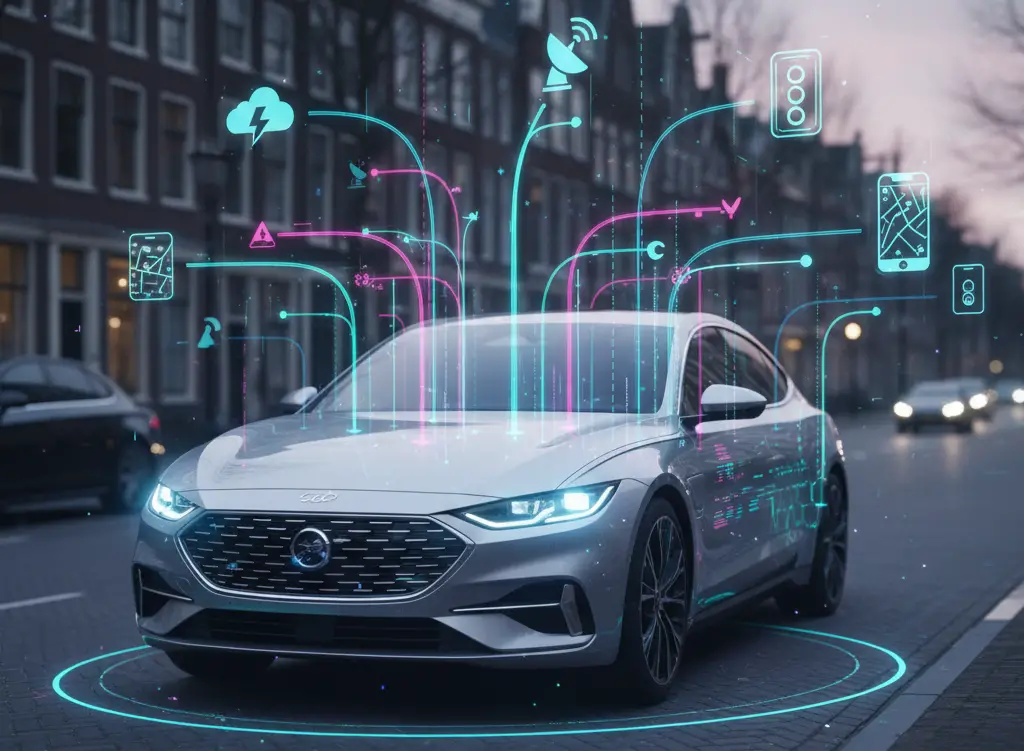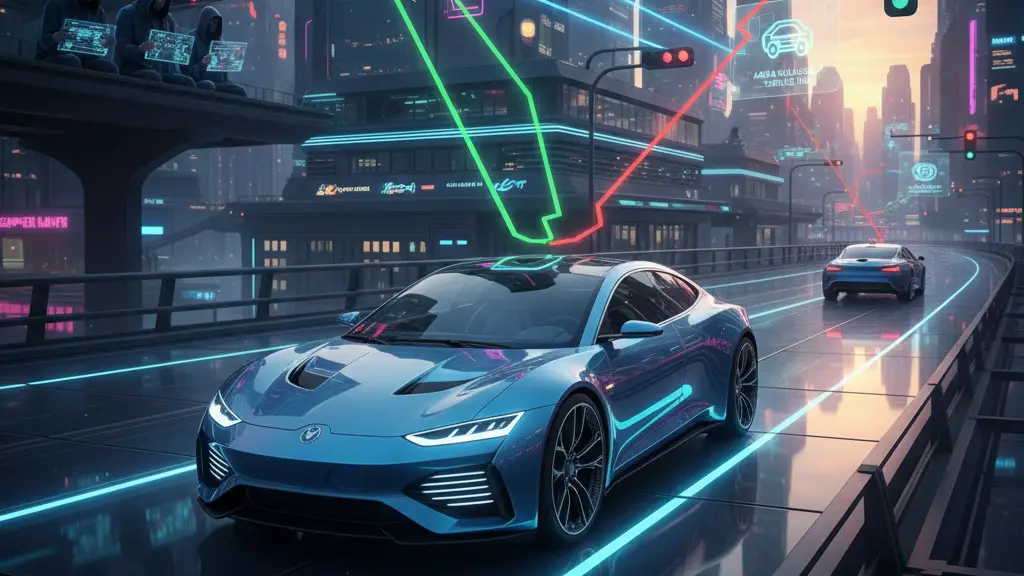What is a connected car and how does it work?
A connected car – literally translated: a connected car – is a car whose systems communicate with systems outside the car via the Internet. That connection can be made via a built-in SIM card, via your smartphone and via a Wi-Fi network. Thanks to that connection, the car can exchange data with, for example, the manufacturer, the dealer, other vehicles and government agencies.
In practice, this means that a car receives live traffic information, makes its own emergency call in case of an accident, signals when it needs maintenance and even remotely receives updates to the infotainment system or driver assistance systems. All without you having to do anything.
How does a connected car work?
A connected car contains various sensors and computers that constantly collect data. Think of speed, GPS location, temperature, fuel consumption, tire pressure and even your driving style. That data is transmitted via an Internet connection to external servers, such as those of the car manufacturer and other service providers.
Some connected cars also communicate with other vehicles or infrastructure – these are called V2V(vehicle-to-vehicle) and V2X(vehicle-to-everything). For example, a connected car can alert its driver if another car ahead brakes suddenly or if you approach a slippery curve. Furthermore, certain functions of the car can be controlled remotely. For example, you can then use an app to remotely lock the car, turn on the air conditioning or request the location of your parked car.
What are the benefits for you as a driver?
The benefits are numerous. If you drive a connected car, for example, you get real-time information about traffic jams, speed cameras and dangerous situations on the road. Your car can make its own maintenance appointment if something threatens to go wrong. If your car is stolen, it is easy to trace.
Connected cars also make driving assistance systems smarter. Think adaptive cruise control that takes into account traffic data, or navigation that takes into account
Benefits to others: dealer, manufacturer and … the government
For dealers and manufacturers, a connected car enables better customer relations and more efficient maintenance. They know exactly when a car is due for service and when a technical problem occurs. That makes maintenance more predictable and cheaper. For manufacturers, it provides valuable information about how cars are used in practice, which in turn leads to better models in the future.
The government also benefits, including in the case of road pricing, for example. But connected cars can also contribute to safer and more efficient traffic. Think of dynamic traffic management or automatic toll payment. In time, a network of connected vehicles can even help prevent accidents.

And the underworld?
Where information flows, there are also risks. Connected cars can be targets of
Big brother in your rearview mirror?
One of the biggest concerns surrounding connected cars is privacy. Who actually sees what you do in your car? Car manufacturers, leasing companies, governments, insurers, app developers – they can all benefit from the data your car collects. But will that data actually be shared? And if so, with whom?
In theory, automakers promise that all data will be collected anonymously. In practice, it proves difficult to make location data truly anonymous. If you know where someone starts (home) and ends (work) each day, identity is often easy to ascertain.
Do you have choice about what data you share?
In many cases, as a driver, you do get to choose what data you share. Some systems only work if you give permission for data collection, while others turn on automatically when you start the car. In the settings menu of modern infotainment systems, you can often control which connectivity services you activate or deactivate.
Sometimes it also depends on the form of contract. With private lease or subscription, manufacturers or leasing companies may require that certain data be shared. So it is wise to read the terms and conditions carefully.
What about your privacy?
The protection of your personal data in a connected car depends on several factors: the manufacturer, legislation (such as the AVG in Europe) and your own settings. European legislation requires manufacturers to be transparent about data processing and give you control over your data.
Still, it is important to be alert. Not all systems are equally secure and some cars use outdated software. Apps you link to your car can also be a weak link.
How can you better protect your data?
If you want more control over your privacy, there are a few steps you can take. Check the privacy settings of your infotainment system. Turn off data collection if you don’t think it’s necessary. Don’t link unnecessary apps or accounts to your car. Also, choose a strong password if you use an associated app.
Can you “un-connect” a connected car?
In many cases, you can (partially) disable your car’s Internet connection. For example, by deactivating certain connectivity options or physically removing the built-in SIM card (on some brands). Just keep in mind that you will then miss out on many useful features. Think of live navigation, real-time traffic information, road hazard alerts, software updates, remote access via an app and automatic emergency calls (eCall).
Some functions – such as eCall – are required by law in new cars and work only when there is an active connection. So completely “un-connecting” is not always possible or desirable.
Get smart with your connected car
The connected car makes driving more comfortable, safer and more efficient. At the same time, it raises questions about privacy and data management. As long as you are aware of what your car collects and shares, you can reap many benefits without losing control. Because in a world where cars are getting smarter, it’s up to you to be smart about your data.

